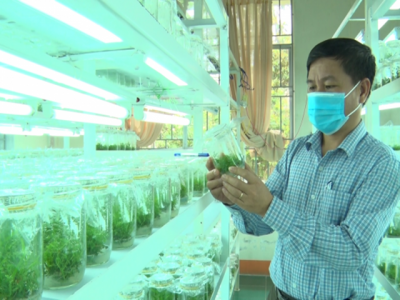Biotechnology in research and production of forest crop

The forestry sector is paying more attention to the application of biotechnology in research and production of forest crops, particularly for large timber forests.
Using molecular markers, gene transfer and gene editing techniques in the research and production of forest crop varieties will become one of the revolutionary research directions. Photo: TD.
The Institute of Forest Tree Improvement and Biotechnology (IFTIB - Vietnam Academy of Forestry Science) has created many new varieties of high yield and quality forest crops thanks to applying biotechnology. The institute also rapidly propagates new varieties into production.
The Institute of Forest Tree Improvement and Biotechnology has also successfully developed diagnostic kits and biotechnological products in service of fauna and flora care along with environmental protection.
The application of biotechnology is therefore considered a breakthrough in agriculture, particularly in the forestry sector. Biotechnology opens up great solutions to develop Vietnam’s agriculture comprehensively towards modernity.
The Institute of Forest Tree Improvement and Biotechnology can be deemed a research pioneer in the forestry sector specifically concerning the application of biotechnology and improvement of forest crop varieties. The institute's biotechnology researches are oriented in three main directions at the moment.
The institute first focuses on studying and perfecting the propagation processes for newly selected and created varieties. Then they will transfer breeding techniques and original seeds to seed research and production units.
The second research direction is to use molecular markers in research to select high-yield and high-quality varieties. The last direction concentrates more on the selection and creation of new varieties using mutagenesis and gene technology which have helped IFTIB achieve outstanding achievements.
At present, the Institute of Forest Tree Improvement and Biotechnology has researched and successfully developed breeding processes for nearly thirty varieties of hybrid acacia and acacia melaleuca, eucalyptus, and hybrid eucalyptus. The institute has transferred these processes to many facilities for mass production.
The institute has completed several breeding processes on an industrial scale through the implementation of pilot production theses and projects. Two breeding processes have been recognized as technological advances.
The institute has transferred industrial-scale micropropagation processes to over thirty production facilities across the country. Having mastered the technology, some units even have the ability to produce ten million seedlings annually to partially meet the demand for clonal afforestation.
For example, to promote intensive afforestation for high-yield, high-quality timber and increase the added value of forestry production, the National Agricultural Extension Center (NAEC) in collaboration with the Vietnam Academy of Forestry Science and Phu Yen Department of Agriculture and Rural Development has initiated the project "Developing large-scale intensive afforestation model using acknowledged tissue-cultured acacia" in the districts of Dong Xuan and Son Hoa.
After two years of implementation, the project has supported 59 households in the communes of Xuan Quang 2 and Xuan Long (Dong Xuan district). The three communes of Son Phuoc, Son Hoi and Ca Lui of Son Hoa district have developed 95 ha of intensive large timber plantation forest for acacia hybrid lines and varieties produced by tissue culture method. The trees are of high quality and disease-free, which results in high output.
According to information from Dr. Nguyen Duc Kien, Director of the Institute of Forest Tree Improvement and Biotechnology, research and transfer to production on forest crop varieties have achieved good results. Biotechnology has gradually made its appearance and further applied in the selection and breeding processes, basically meeting forest production demand nationwide.
However, these are only preliminary results so they have not yet fully reflected the potential of biotechnology in research on selecting forest tree varieties.
In the coming time, in addition to the implementation of traditional breeding studies based on natural variations, the research and application of biotechnology, including the use of molecular markers, gene transfer techniques, gene editing will become one of the revolutionary research directions.
“The Institute of Forest Tree Improvement and Biotechnology will pay more attention to the development of biotechnology and other high technology in the near future, thereby improving its position and contribution rate in forest tree breeding programs
Dr. Nguyen Duc Kien, Director of the Institute of Forest Tree Improvement and Biotechnology
Related news
 Straw mushrooms cultivation becomes more and more prosperous
Straw mushrooms cultivation becomes more and more prosperous Straw mushroom growing is creating jobs and good income for farmers by making full use of straw by-products. After harvesting, straw is also used to produce
 Organic fertilisers bring high efficiency to gladiolus production
Organic fertilisers bring high efficiency to gladiolus production Gladiolus growing models in Hai Phong City have seen positive results thanks to the use of organic fertilisers.
 The first province develops a project to tackle plastic pollution in agriculture
The first province develops a project to tackle plastic pollution in agriculture With 135,000 hectares under crop production, there is around 1,793 tons of plastic waste discarded every year in Hoa Binh.